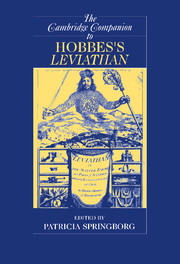Book contents
- Frontmatter
- General Introduction
- Part I: Of Man
- Part II: Of Commonwealth
- Part III: Of a Christian Commonwealth
- Part IV: Of the Kingdom of Darkness
- 14 Hobbes’s Critique of the Doctrine of Essences and Its Sources
- 15 Leviathan and Its Anglican Context
- 16 The Bible and Protestantism in Leviathan
- 17 The 1668 Appendix and Hobbes’s Theological Project
- Part V: Hobbes’s Reception
- Bibliography
- Index
- Series List
16 - The Bible and Protestantism in Leviathan
from Part IV: - Of the Kingdom of Darkness
Published online by Cambridge University Press: 28 November 2007
- Frontmatter
- General Introduction
- Part I: Of Man
- Part II: Of Commonwealth
- Part III: Of a Christian Commonwealth
- Part IV: Of the Kingdom of Darkness
- 14 Hobbes’s Critique of the Doctrine of Essences and Its Sources
- 15 Leviathan and Its Anglican Context
- 16 The Bible and Protestantism in Leviathan
- 17 The 1668 Appendix and Hobbes’s Theological Project
- Part V: Hobbes’s Reception
- Bibliography
- Index
- Series List
Summary
Hobbes represented himself in various places in Leviathan as a good English Protestant. There are numerous sentences in Leviathan about Christianity, which, if uttered by almost anyone else in seventeenth- century England, would be understood as expressions consonant with Calvinism or Lutheranism. All scholars would agree about that. What scholars disagree about is whether Hobbes's representation was serious or not, honest or not, sarcastic or not, intentionally subversive or not. Most scholars think that he was not being honest, and many of these think that he intended his perceptive readers to see that, in context, he intended to subvert Christianity in particular and revealed religion in general. The minority view, one that I have defended, is that he was serious and honest. This is not to say that he was not also ill-disposed towards various brands of Christianity, especially Roman Catholicism and Presbyterianism, and prone to sarcasm. He was. His views, in my opinion, were intended to justify a narrow space in the broad band of seventeenth-century English Christianity. Leaving aside his views about the Bible, his basic positions would have been perfectly respectable forty years earlier, during the reign of James I and VI: orthodox in doctrine, Calvinist in theology, episcopal in ecclesiology, non-puritan in liturgy, and monarchical in politics. By 'orthodox', I simply mean that he professed belief in the doctrines of the major early creeds and the Thirty-nine Articles.
- Type
- Chapter
- Information
- The Cambridge Companion to Hobbes's Leviathan , pp. 375 - 391Publisher: Cambridge University PressPrint publication year: 2007
- 5
- Cited by

